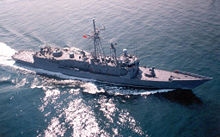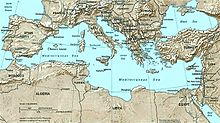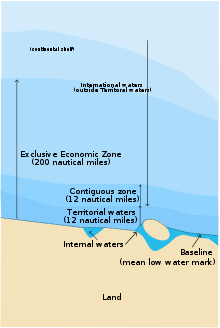- Mediterranean Oil Dispute
-
The Mediterranean Oil Dispute is a current political incident and standoff between the Republic of Cyprus and Turkey, and potentially affecting other neighbouring states in the Eastern Mediterranean, such as Israel, Lebanon, and Egypt. The breakaway territory of Northern Cyprus also advocates its interests as part of the dispute.
The dispute is primarily focussed on Turkish and Turkish Cypriot objections to the drilling of potentially substantial oil and gas reserves in the Eastern Mediterranean, specifically in waters that Cyprus has legally asserted a claim to under international maritime law. Turkey is currently the only member of the United Nations to refuse to recognise the sovereignty of the Republic of Cyprus.
Contents
Historical Relations between Cyprus and Turkey
Relations between the neighboring states of Cyprus and Turkey have escalated from tense to violent confrontation twice since 1964, resulting in the 1964 Battle of Tylliria and the 1974 Turkish Invasion of Cyprus. From 1997 to 1998, the two countries entered into escalated confrontation during the Cyprus Missile Crisis, almost resulting in open conflict. In 2000 and 2002, the situation escalated again during Turkish Air Force incursions over Paphos in the south of the island, resulting in the Cyprus Air Forces locking-on to the aircraft with surface-air missile systems[1].
Turkey does not recognize the Republic of Cyprus as a sovereign state, the only member of the UN to fail to do so. Conversely, Turkey recognizes the self-proclaimed Turkish Republic of Northern Cyprus in the north of the island[2], and in this instance, she is the only UN member state to assert full recognition for this breakaway territory.
Cyprus and Turkey have, since the cessation of hostilities on 18 August 1974, exercised no formal relations beyond activities organised at the instigation of the UN Secretary General. Both nations remain at a de-facto state of war, and the situation has been likened to a microcosmic Cold War.
Sine 2004, Turkey has attempted to gain entry to the European Union, a move which has been vetoed by the Republic of Cyprus, outwardly whilst Turkey continues to block access to her air and sea ports for Cypriot transport routes[3]. The political situation is complicated by the question of Turkey's continued occupation of northern Cyprus, the claim of the latter to independent statehood, and the question of NATO stability as Greece and Turkey (both member states) strongly dispute the Cyprus problem.
Hydrocarbon Resources near Cyprus
The Republic of Cyprus has established a legal claim to an EEZ or Exclusive Economic Zone in an area of waters south of the island. The area of highest interest by Cyprus is Block-12, which covers approximately 800,000 acres of sea space, which borders a substantial area of waters delimited by Israel for its own EEZ. Cyprus has achieved firm agreements with neighboring Israel and Egypt regarding the distribution of respective zones, but has not reached firm agreements with Lebanon and Syria. Cyprus has enshrined her right to drill for oil in an Exclusive Economic Zone which it regards as in accordance with international law and the Law of the Sea Convention.
Currently, the Republic of Cyprus has signed concessions to Noble Energy, a US based company, to conduct drilling in Block-12 of the Cypriot EEZ, and that concessions may be available for an Israeli company, Avner and Delek Drilling, to participate in the oil and gas drilling program[4].
Turkish Reactions
Turkey has repeatedly threatened that it will not allow the Republic of Cyprus to proceed with pursuing claims to hydrocarbon deposits in waters south of the island. She has also threatened to retaliate by conducting oil and gas exploration off the shores of Northern Cyprus. It is not clear whether the incident could escalate to violence, as the Turkish Government has not made clear whether it regards oil and gas exploration by the Republic of Cyprus as an act of aggression.
However, in November 2008, Turkish naval vessels harassed Cyprus contracted vessels conducting seismic exploration for hydrocarbon deposits in waters south of the island[5].
Cypriot Reactions
Cyprus has actively sought to reinforce its position on the global stage through congress with major international players in the situation. Cypriot Foreign Minister Erato Kozakou-Marcoullis began her term in office in late 2011 by visiting both Greece and Israel to request support for the drilling program[6], though it is not clear if military support was also requested. It is also widely believed that Cyprus has requested support from the United States of America and the Russian Federation, though the exact specifics of any representations have not been made public.
As of August 2011, the Cypriot media has shown widespread alarm at Turkish threats to intervene against the drilling program, and has remonstrated with the Turkish position as evidence of a violation of national sovereignty and the rights of the Cypriot people.
Potential for Escalation to Armed Conflict
Turkey has organised a major air and naval exercise to take place at the same time drilling by the Cypriot contractors is due to begin in September 2011[7].
Although no mobilization has been outwardly exercised by the Cyprus Government of its National Guard, the island does possess a fortified air base at Paphos which routinely hosts arrivals of Greek and other EU aircraft.
A possible sign of concern has been raised by reports that the Russian Navy had been ordered in late August 2011 to scramble two nuclear attack submarines to the Eastern Mediterranean to observe the situation[8], as Cyprus and Russia have enjoyed close political and economic ties in recent years[9].
Israel has also been reported to have increased the number of surveillance flight operations in the Eastern Mediterranean[10], though it is not clear if these operations include the Nicosia Flight Information Region.
References
- ^ http://www.independent.co.uk/news/world/europe/denktash-warns-of-war-risk-635037.html
- ^ http://www.un.org/documents/sc/res/1984/scres84.htm
- ^ http://www.cyprus-mail.com/turkey/erdogan-helm/20110612
- ^ http://www.cyprus-mail.com/cyprus/israeli-energy-talks-very-serious/20110823
- ^ http://www.cyprus-mail.com/cyprus/drilling-looms-wikileaks-reveals-previous-tensions/20110824
- ^ http://www.cyprus-mail.com/cyprus/marcoullis-we-got-support-we-needed-and-are-very-satisfied/20110826
- ^ http://www.cyprus-mail.com/cyprus/drilling-looms-wikileaks-reveals-previous-tensions/20110824
- ^ http://www.cyprusnewsreport.com/?q=node/4540
- ^ http://www.csmonitor.com/World/terrorism-security/2010/0701/Russian-spy-ring-paymaster-disappears-from-Cyprus
- ^ http://www.npr.org/templates/story/story.php?storyId=139236781
Categories:- Cyprus–Turkey relations
Wikimedia Foundation. 2010.



